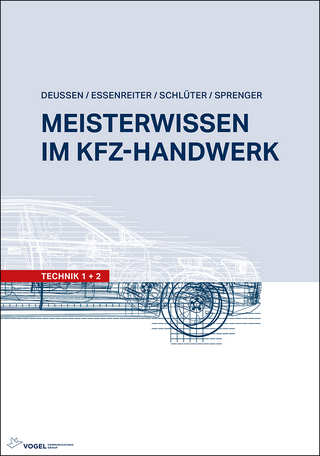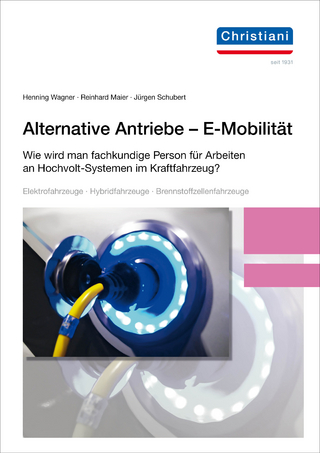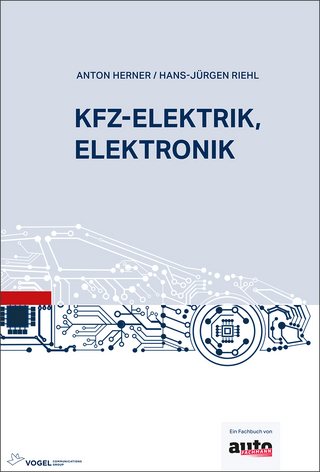
Handbook on New Paradigms in Smart Charging for E-Mobility
Elsevier - Health Sciences Division (Verlag)
978-0-323-95201-9 (ISBN)
- Noch nicht erschienen (ca. Januar 2025)
- Versandkostenfrei
- Auch auf Rechnung
- Artikel merken
This book will be beneficial for engineers, scientists, and researchers, providing them with a comprehensive standard benchmark work to explore the evolving aspects of charging infrastructure for E-mobility. Further, it will also help policymakers, practitioners and government entities to formulate policies for successful implementations of E-motility for their masses. The techno-socio-economic focus will serve as standard literature for all.
Dr. Abhishek Kumar is currently a Postdoctoral Research Fellow at College of Electrical Engineering, Zhejiang University (ZJU), China. He also served as an Assistant Professor at the National Institute of Technology (NIT), Yupia, India from 2012-2014. His research includes Sustainable Rural Electrification Systems, Microgrids, Power Electronics & applications in Renewable Energy Systems, Optimization and application of Decision Analysis in Energy Planning, Smart Grids and E-mobility solutions, State of the art algorithm development for Power & Energy Applications, and more. He was awarded TEQIP India Government Master Scholarship in 2010 and Chinese Government Scholarship for Doctoral Degree study at Zhejiang University in 2014 respectively. He acquired special First Category Merit-based Funding from Zhejiang Provincial Government under Provincial Postdoctoral Advance Program in 2020. He has contributed as a role of Outstanding Reviewer for many prestigious journals and also as a Review Editor of Frontiers in Sustainability. Prof. Praveen Kumar did his BTech from REC Hamirpur (now NIT Hamirpur) in electrical engineering, MTech from IIT Delhi in Energy Studies, and Ph.D. from TU Delft with a specialization in electrical machine design. Earlier, he was Team Leader of the Hybrid Systems group in Drive Trains Innovation BV, The Netherlands; Co-Founder of elmoCAD GmbH, Germany; Development Engineer at Trimeric GmbH, Germany and Durr AG, Germany. Prof. Kumar’s research activities are in optimizing electrical motors and drives; state-of-the-art algorithm development for multi-objective optimization and simulation, and design of electrical motors and actuators using Finite Element Methods. In 2009 he established the e-mobility lab at IIT Guwahati. Recently he launched an MS by Research Programme in e-mobility, the first of its kind in India. Prof. Kumar also heads the intellectual property rights cell of IIT Guwahati and is an advocate of the importance of IPR in the new economy. Dr. Xiangning He received B.Sc. and M.Sc. degrees from Nanjing University of Aeronautical and Astronautical, Nanjing, China, and his Ph.D. from Zhejiang University, Hangzhou, China. Since 1996, he has been a Full Professor in the College of Electrical Engineering, Zhejiang University. He was Director of the Power Electronics Research Institute, Head of the Department of Applied Electronics, Vice Dean of the College of Electrical Engineering, and is currently the Director of the National Specialty Laboratory for Power Electronics, Zhejiang University. Dr. He has worked as a visiting/guest professor in the U.K., U.S.A., and Australia. He is PI of 12 international joint projects with universities and companies and PI for more than 50 national, provincial and industrial research and development projects. His work has won the State Natural Science Award, State Technology Invention Award, Golden Prize of Geneva International Invention Exhibition, and four provincial and ministerial Scientific and Technological Progress awards. Ramesh C. Bansal is a Professor at University of Sharjah and Extraordinary Professor at University of Pretoria. He has over 25 years of teaching and research experience, and previously worked at University of Pretoria, University of Queensland, University of South Pacific, and BITS, Pilani. He has published over 400 journal/conf. papers, books/book chapters, and is he AE/Editor of many reputed journals. He has Google citations of over 16000 and h-index of 60. He has supervised 25 PhD, 5 Post Docs. He is a Fellow of IET-UK, IE (India), SAIEE (South Africa).
Part 1: State of the art in charger technology
1. Types of EV charging
2. Battery chemistries
3. EV charging protocols and communication techniques
4. Control algorithms for EV charging
5. Deployment of chargers-A global perspective
Part 2: Renewable energy integration to charging infrastructure
6. Renewable energy generation types
7. Technological status of RES- Current and Future Trends
8. Requirements of integration of RES with charging infrastructure
9. Integration of RES to EV charging-sate of the art
10. RES and EV charging-potential scenarios
Part 3: Use of energy storage system in charging infrastructure
11. Types and classifications of electrical energy storage systems (ESS)
12. Integration of ESS with grid
13. ESS and renewable energy
14. ESS for chargers with RES
15. Energy management with ESS, RES and grid during charging
Part 4: Power electronics (PE) and EV chargers
16. State of the art of PE converters used in chargers
17. New converter topologies for PE converters for charger application
18. Potential of wide band gap (WBG) devices of EV chargers
19. High power converters for wireless and fast chargers
Part-5: Policies, politics and socio-economic dimensions of E-mobility infrastructure
20. Socio-techno and commercial dimensions of E-mobility infrastructure
21. Charging infrastructure as an enabler for E-mobility
22. Potential of smart charging infrastructures for emerging economies
23. Quality of live and human development via E-mobility
24. Case studies and institutional polices strategies towards E-mobility
25. Future policy recommendation for enabling E-mobility as a service for masses
| Erscheint lt. Verlag | 1.1.2025 |
|---|---|
| Verlagsort | Philadelphia |
| Sprache | englisch |
| Maße | 152 x 229 mm |
| Themenwelt | Sachbuch/Ratgeber ► Natur / Technik ► Fahrzeuge / Flugzeuge / Schiffe |
| ISBN-10 | 0-323-95201-1 / 0323952011 |
| ISBN-13 | 978-0-323-95201-9 / 9780323952019 |
| Zustand | Neuware |
| Haben Sie eine Frage zum Produkt? |
aus dem Bereich


